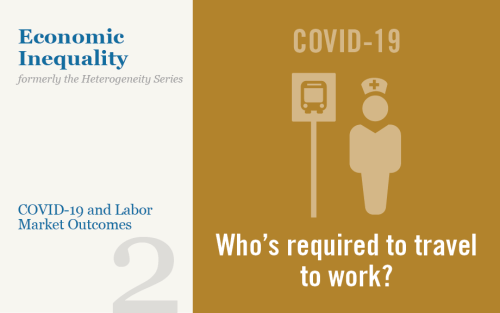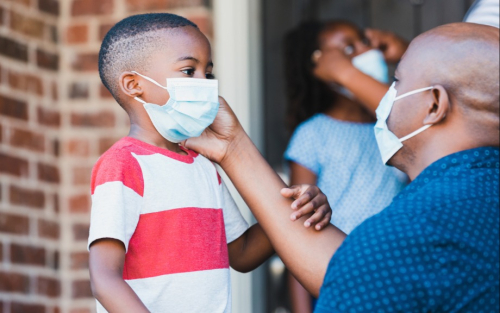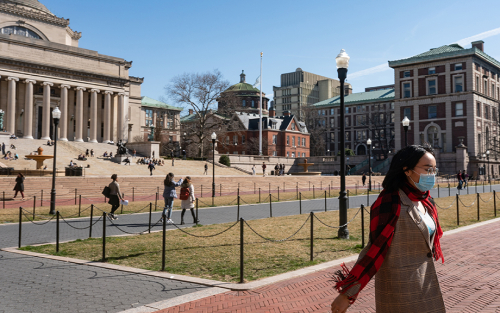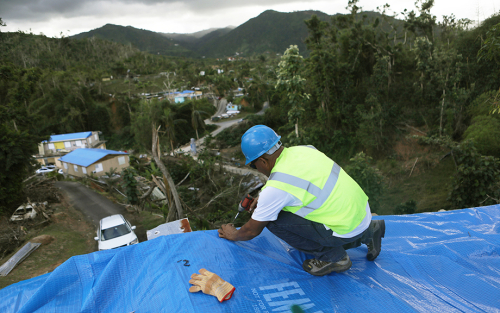February Regional Business Surveys Find Widespread Supply Disruptions

Business activity increased in the region’s manufacturing sector in recent weeks but continued to decline in the region’s service sector, continuing a divergent trend seen over the past several months, according to the Federal Reserve Bank of New York’s February regional business surveys. Looking ahead, however, businesses expressed widespread optimism about the near-term outlook, with service firms increasingly confident that the business climate will be better in six months. The surveys also found that supply disruptions were widespread, with manufacturing firms reporting longer delivery times and rising input costs, a likely consequence of such disruptions. Many firms also noted that minimum wage hikes implemented in January in both New York and New Jersey had affected their employment or compensation decisions.
Understanding the Racial and Income Gap in Commuting for Work Following COVID‑19

The introduction of numerous social distancing policies across the United States, combined with voluntary pullbacks in activity as responses to the COVID-19 outbreak, resulted in differences emerging in the types of work that were done from home and those that were not. Workers at businesses more likely to require in-person work—for example, some, but not all, workers in healthcare, retail, agriculture and construction—continued to come in on a regular basis. In contrast, workers in many other businesses, such as IT and finance, were generally better able to switch to working from home rather than commuting daily to work. In this post, we aim to understand whether following the onset of the pandemic there was a wedge in the incidence of commuting for work across income and race. And how did this difference, if any, change as the economy slowly recovered? We take advantage of a unique data source, SafeGraph cell phone data, to identify workers who continued to commute to work in low income versus higher income and majority-minority (MM) versus other counties.
Job Seekers’ Beliefs and the Causes of Long‑Term Unemployment

In addition to its terrible human toll, the COVID-19 pandemic has also caused massive disruption in labor markets. In the United States alone, more than 25 million people lost their jobs during the first wave of the pandemic. While many have returned to work since then, a large number have remained unemployed for a prolonged period of time. The number of long-term unemployed (defined as those jobless for twenty-seven weeks or longer) has surged from 1.1 million to almost 4 million. An important concern is that the long-term unemployed face worse employment prospects, but prior work has provided no consensus on what drives this decline in employment prospects. This post discusses new findings using data on elicited beliefs of unemployed job seekers to uncover the forces driving long-term unemployment.
How Do Consumers Believe the Pandemic Will Affect the Economy and Their Households?

In this post we analyze consumer beliefs about the duration of the economic impact of the pandemic and present new evidence on their expected spending, income, debt delinquency, and employment outcomes, conditional on different scenarios for the future path of the pandemic. We find that between June and August respondents to the New York Fed Survey of Consumer Expectations (SCE) have grown less optimistic about the pandemic’s economic consequences ending in the near future and also about the likelihood of feeling comfortable in crowded places within the next three months. Although labor market expectations of respondents differ considerably across fairly extreme scenarios for the evolution of the COVID pandemic, the difference in other economic outcomes across scenarios appear relatively moderate on average. There is, however, substantial heterogeneity in these economic outcomes and some vulnerable groups (for example, lower income, non-white) appear considerably more exposed to the evolution of the pandemic.
Delaying College During the Pandemic Can Be Costly

Many students are reconsidering their decision to go to college in the fall due to the coronavirus pandemic. Indeed, college enrollment is expected to be down sharply as a growing number of would-be college students consider taking a gap year. In part, this pullback reflects concerns about health and safety if colleges resume in-person classes, or missing out on the “college experience” if classes are held online. In addition, poor labor market prospects due to staggeringly high unemployment may be leading some to conclude that college is no longer worth it in this economic environment. In this post, we provide an economic perspective on going to college during the pandemic. Perhaps surprisingly, we find that the return to college actually increases, largely because the opportunity cost of attending school has declined. Furthermore, we show there are sizeable hidden costs to delaying college that erode the value of a college degree, even in the current economic environment. In fact, we estimate that taking a gap year reduces the return to college by a quarter and can cost tens of thousands of dollars in lost lifetime earnings.
Finally, Some Signs of Improvement in the Regional Economy

The Federal Reserve Bank of New York’s June business surveys show some signs of improvement in the regional economy. Following two months of unprecedented decline due to the coronavirus pandemic, indicators of business activity point to a slower pace of contraction in the service sector and signs of a rebound in the manufacturing sector. Even more encouraging, as the regional economy has begun to reopen, many businesses have started to recall workers who were laid off or put on furlough since the start of the pandemic. Some have even hired new workers. Moreover, businesses expect to recall even more workers over the next month. Looking ahead, firms have become increasingly optimistic that conditions will improve in the coming months.
Job Training Mismatch and the COVID‑19 Recovery: A Cautionary Note from the Great Recession

Displaced workers have been shown to endure persistent losses years beyond their initial job separation events. These losses are especially amplified during recessions. (1) One explanation for greater persistence in downturns relative to booms, is that firms and industries on the margin of structural change permanently shift the types of tasks and occupations demanded after a large negative shock (Aghion et al. (2005)), but these new occupations do not match the stock of human capital held by those currently displaced. In response to COVID-19, firms with products and services that complement social-distancing (like Amazon distribution centers) may continue hiring during and beyond the recovery, while workers displaced from higher risk industries with more stagnant demand (for example, airport personnel, local retail clerks) are left to adjust to unfamiliar job opportunities. As some industries reopen gradually while others remain stunted, what role might workforce development programs have in bridging the skill gap such that displaced workers are best prepared for this new reality of work?
U.S. Virgin Islands Struggle While Puerto Rico Rebounds

Almost two years after hurricanes Irma and Maria wreaked havoc on Puerto Rico and the U.S. Virgin Islands, the two territories’ economies have moved in very different directions. When the hurricanes struck, both were already in long economic slumps and had significant fiscal problems. As of mid-2019, however, Puerto Rico’s economy was showing considerable signs of improvement since the hurricanes, while the Virgin Islands’ economy remained mired in a deep slump through the end of 2018, though signs of a nascent recovery began emerging in early 2019. In this post, we assess the contrasting trends of these two economies since the hurricanes and attempt to explain the forces driving these trends.












 RSS Feed
RSS Feed Follow Liberty Street Economics
Follow Liberty Street Economics